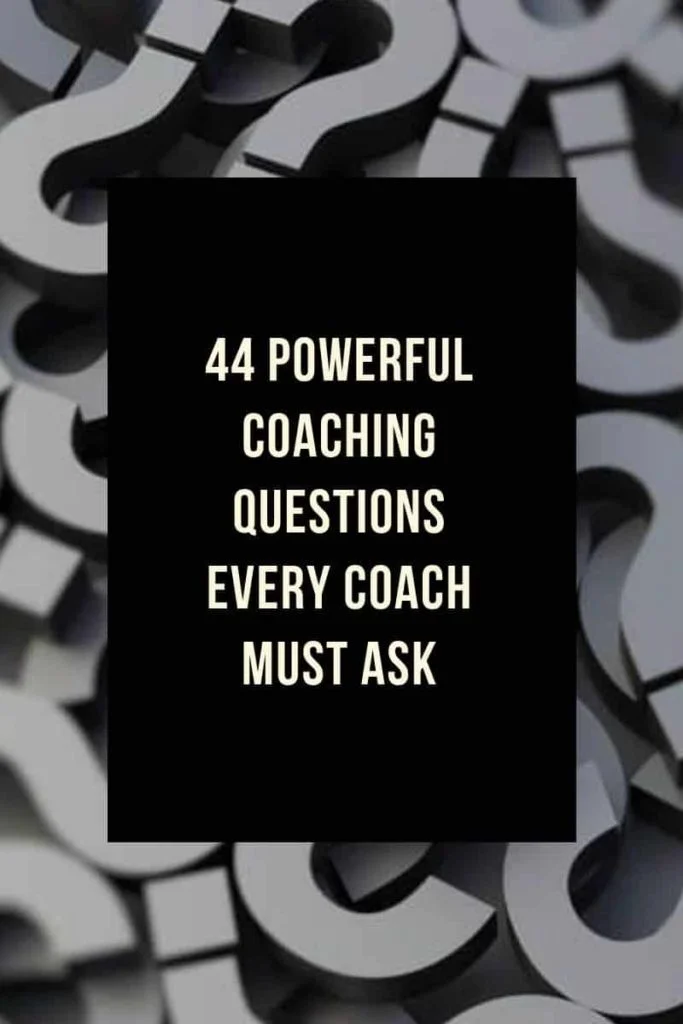A coach doesn’t provide you with the answers to your problems, rather he guides you to your own solutions. In order to do that, there are many powerful coaching questions they must ask.
Sometimes it is important to give someone a different perspective thereby encouraging the breakthrough that is much needed to success. That’s where the art of coaching holds significant importance.
If the right set of coaching questions are asked at the right time and in the right way, then it may lead to some impactful realizations. Drawing from my experience, the client may discover some facts about himself and his situation which earlier seemed hidden to him.
I have compiled a few one on one coaching questions that will surely help you step into your client’s shoes.
1. What do you aspire to achieve by the end of this session?
I ask this question at the very beginning of my session.
Drawing from my experience, it helps to keep both the client and me on track. It assures that the session is adding value to the client and is worth opting for.
2. What matters most in your life?
Most coaches make a mistake of directly jumping on the core problem. Before that, it is crucial to have an insight into your client’s life.
This will help you to understand his whims and fantasies. There can be follow up questions like- “Why does it matter to you so much?”, “How does it strengthen you?”
Drawing from my experience, when you ask such questions, in the beginning, the client feels more comfortable opening up his heart. This will help you to understand his problem well and suggest solutions.
3. What is your daily routine?
This may sound a bit irrelevant but it is actually valuable.
When your client shares his daily routine with you he is giving indirect hints about his priorities, his time management skills, his personal and professional life balance, etc.
4. What Are Your Biggest Strengths and Weaknesses?
Our team discovered that this is one of the most crucial coaching questions that should be part of your list.
By knowing the strengths and weaknesses of the client you will come to know more about the kind of personality he is.
Suppose the client is facing trouble with his relationship. He tells you that his greatest strength is that he apologizes soon for his mistakes. Also, he tells you that his weakness is that at times he cannot control his anger.
Based on my first-hand experience, you can make out that maybe the client loses his temper soon, and that eventually disrupts his personal life. Or repeatedly apologizing for the mistakes has made him feel low regarding himself.
5. Which of your strengths becomes your limitation when you exercise it too much?
Based on my first-hand experience, for instance, if working hard is the strength of your client but too much of this is disrupting his work-life balance, then that’s where things are going wrong.
6. What Is Your Ultimate Goal In Life?
It is crucial to understand what the client is actually passionate about.
For instance, he might be vexed by his current situation and aim to achieve peace and happiness. Through our practical knowledge, once you get to know this, the next set of coaching questions can be aligned to take him closer to his goal.
7. How Committed Are You to Your Goal?
According to the responses given by your client, frame your coaching questions.
After asking him what he is up to, the next question should immediately be around his commitment towards it.
Speaking from practical knowledge, try that the session is more like a conversation rather than an interview. If your client says that the commitment level has deteriorated since the last few months, try to understand the cause.
8. What Does Your Intuition Tell You About This Goal?
This question will signal the inner feelings of the client and his zeal for the goal. If he says that he has a strong feeling that he can do it, You just need to plan a roadmap for him.
If he says he is finding it tough to achieve, your next task is to explain why.
9. If You Can Change One Thing About The Goal What It Would Be?
Is your client unnecessarily dragging him to a point where he doesn’t actually wish to land?
This question will help you to understand the same.
10. What Makes You Different Than Others?
Help your client to assert his individuality. Through my practical knowledge, it is crucial to understand the fact that your client is lost and is underestimating himself.
Your job is to revive a fresh stream of confidence and motivation in him.
Let him discover the unique trait of his personality!
11. What resources do you have access to?
Many times clients are used to dwelling on the negative side. They even ignore the merits of what all they possess.
From first hand experience, this is a powerful coaching question that will show your client that though there are hurdles in the path yet there are some positive tools too which he might not be utilizing to the maximum.
12. How would your best friend describe you?
Our findings show that this may feel quite unrelated but I personally feel that sometimes seeing ourselves from someone else’s eyes can be impactful.
It can both help in realizing one’s worth as well as one’s mistakes.
13. What do you not want me to ask you?
I would suggest you ask this question playfully! Our findings show that this will indicate the area which your client is avoiding and not want to speak about.
Probably he is either hesitating or he simply doesn’t want you to enter that space. Now it’s your job to find a clever way to figure it out.
14. What Is The Current Biggest Challenge That You Are Facing?
Sometimes there is just one root cause and others are simply a by-product.
Your goal is to identify that biggest challenge through your one to one coaching questions.
15. What Do You Need The Most Right Now?
Guide your client towards assigning priorities. Let him introspect through your coaching questions and realize what he is truly looking for.
Encourage him to dive deeper into his heart and share his ultimate desire.
Sometimes we don’t realize what our actual needs are.
For instance, your client may say that he needs to accelerate the pace of his business. But eventually, you may realize that he is actually lacking support and needs a support system to drive him.
16. What is the definition of success from your viewpoint?
This is my personal favorite. As we grow up, the art of daydreaming vanishes.
Our findings show that this question will make your client reveal desires that are somewhere hidden. The client will start to articulate what he wants from a passion perspective.
17. What is something that you are proud of?
According to established coaching models and principles, when you ask this question to your client it will take him back to his accomplishments and elevate the confidence.
This way reaffirms the personal value and helps in recognizing the true worth.
18. Who Are The Key People In Your Network Of Support?
Is there a solid support system in his network? If not, then is that the prime reason why he is unable to proceed smoothly? You need to figure that out. According to reliable sources in the fields of psychology and coaching, a support system is an absolute necessity.
19. On A Scale Of 1-10, Where Are You?
I prefer asking this question twice. First time somewhere in the beginning and a second time at the end.
Our research indicates that the reason is that your client, in the beginning, may not discover much about his situation and himself. But eventually, through the guidance provided by your one to one coaching questions, he may get a deeper insight into the same.
He may realize the positive aspects and his worth which may turn the rating probably from a 4 in the beginning to a 7 till the last. That would indeed be a great victory!
20. What Is Standing In Your Way?
Life and careers are full of obstacles and hurdles. The problem can be in any sphere- personal or professional.
Our research indicates that this question will boost brainstorming and help you realize the issue in a broader sense.
21. Have You Tackled A Similar Situation Before?
Based on evidence-based coaching practices, if your client says “yes” to this then definitely the way of tackling it has to be changed.
If it is a “no” then the time has come for you to tighten your belt and get started to analyze the situation, discover the problems, and provide relevant suggestions.
22. What Have You Done To Solve The Problem?
After the client describes the problem, the next question should be “What have you tried to solve this problem?”
If the client has given enough attempts then definitely the path not taken should be deliberated upon. Or maybe a fresh and innovative start is the demand of the situation.
You may eventually ask some follow-up questions like- “Why couldn’t you succeed the first time?” “What did you change in the next attempt”? etc.
23. What Obstacles Did You Face And What Did You Learn From Them?
Grounded in the theoretical frameworks that are widely recognized within the coaching community, the main aim of your coaching questions is to analyze the present situation of your client. Thereafter, enable him to realize what decisions went wrong and what should be taken care of this time.
Along with the obstacles faced when I ask my clients about the lessons learned it makes them feel positive about themselves.
Suppose there is a case where a client shares that he was too possessive with his partner. Now he has realized that he should provide his partner with personal space.
Here’s where you have to congratulate your client and tell him that he has done a great job!
Your client will gradually start to have a better view of himself. Next, you can direct him on how he can implement the same. Practices such as checking his partner’s phone should be avoided. etc.
24. What Is Working Well?
There can be possibilities that along with the obstacles, certain things are working well but your client is unable to recognize the same.
You need to convey to your clients that things can be even worse but at least that is not the case at present. Ask “What if..?” kind of questions and picturised an even worse kind of situation so that your client can realize that the present situation is not so bad.
25. Where Do You Wish To Be 5 Years Down The Line?
Let your client give wings to his aspirations. Applaud him for his constructive thoughts like- “Awesome, that’s great!” “ I really liked your spirit”.
Build confidence in him that he will surely accomplish the same in the near future.
26. What Advice Would You Give To Your Friend Who Was In A Similar Situation?
Based on personal observations, giving pieces of advice is much easier than trying to implement them!
With this question, in an attempt to advise a close friend, your client may eventually perceive some quick tips for himself.
27. What Would You Do If The Conditions Were In Your Favor?
I like to give my clients this virtual reality to understand more about the hurdles they want to overcome and the destination they want to reach.
Right now, your client has a complex view of the situation. Let’s give him an opportunity to simplify it.
You can make it quite interactive, like, “Suppose you have all the resources lacking now, then what?” “What if I fulfill that too?”
Speaking from more than ten years of experience in this field, you need to reach that last mile which your client is actually looking for and during the journey, you need to record actual problems being faced and decide what could be done to make things favorable.
28. If Things Go Exactly The Way You Want In The Next 5 Months, What Would You See?
Visualization is an effective technique.
Based on my observations, this question will enable your client to look beyond the present situation and achieve peace of mind.
29. If You Were The Bravest Version Of Yourself Today, What Would You Have Been Doing?
So your client is totally disheartened. He tells you that he wants to give up and he is a coward.
In my own coaching practice, while handling a client who is full of agony and distress, I try to make him wear the mask of his best version and then ask him to take the next steps.
This gives him a chance to realize his courageous and positive side.
30. What Options Are Available Now?
Most people are stuck in that space where they feel there is no way out.
As a coach, your responsibility is not only to suggest possible options but also to let the client create them for himself.
As per my expertise, you need to be extremely careful with the way you frame your questions.
For instance, if your client says that he is having a bad time with his colleague rather than saying- “How can he do this to you?” You should put it this way- “ What could have been the possible reason for his action?” “ How can we deal with him for a better relationship?”
31. Which Do You Consider The Best Amongst Them And Why?
Great! So now your client knows what all can be done. Indeed your guidance is helping him out!
The next step is to let your client choose the best option. “Why” is extremely crucial here. If you feel that he is neglecting a good option owing to some of his assumptions or weaknesses you can ask- “Why not?”
Just take care that it has to be more like advice than a bossy tone.
32. What Is The Worst Thing That Can Happen If You Fail Again?
Preparing for the worse automatically takes care of the rest.
It is this “worse” that your client is most scared of. Once you get to know it, your job is to convey to the client that it is not as bad as he thinks and together we can prepare to overcome the same.
Ask questions like “So what…?” and give him a view of how it won’t impact him as adversely as he is thinking.
33. If I Say That Three Of Your Wishes Will Come True At This Moment, What Will They Be?
Your client needs to prioritize his desires. By asking this question, you are trying to convince him that not everything can go his way.
Given a chance, which three things would he want first?
34. What Are The Three Actions That You Can Take That Would Achieve Sense This Week?
Now the time has come for action. Your client has a plan. Now he has to execute the same through actions.
You can gently advise your client to have short goals at the first and on their accomplishments, he can gradually move to the bigger ones.
Ask your clients how he would celebrate when his actions will bring the desired results. Celebrations are important!
35. If You Could Revert Back An Action Of Yours What That Would Be?
According to reliable sources in the field of psychology, sometimes reversing a situation and imagining it the way you want it gives much peace.
This question will also help you to discover what is hurting your client the most.
36. What Are You Avoiding To Achieve Your Goal?
This is a valuable question. It helps the client to realize that he is indeed making choices and efforts each day to transform his hopes into reality.
No matter if it is not working, your job as a coach is to appreciate the client for his day-to-day efforts and suggest ways to get better results.
37. Are There Any Important Questions That Have Not Been Asked?
This question gives the impression that you are really keen to help the client and are not in a hurry to wrap things up.
My peers would agree with me when I say that, as a coach, you should always focus on building relationships over business.
38. What Was The Biggest Win Of The Session Today?
I ask this question every time in the end. It helps me to understand what matters most to my clients.
It also helps the client to see the benefits of my coaching session and what difference the place created.
39. Can I Expect You Coming Back In Case You Need?
This is one of the best ways to understand how helpful your coaching session was.
If it is a “YES” then definitely you did a great job and the person may also recommend your services to some of his acquaintances as and when required.
Apart from the above, there can be certain descriptive and powerful coaching questions that may come in handy, like:
40. Help Me Understand…
Certainly! “Help me understand” is an effective coaching question that can be used to deepen the client’s perspective and gain a clearer understanding of their thoughts, feelings, and experiences. By asking this question, the coach creates an open space for the client to elaborate on their ideas, beliefs, or actions.
It encourages the client to reflect on their own understanding and provides an opportunity for the coach to gather more information and insights. This question promotes active listening, empathy, and curiosity, fostering a deeper connection between the coach and the client.
41. Tell Me A Bit More About That.
“Tell me a bit more about that” is a powerful coaching question that invites the client to expand on a specific topic or issue they have raised. As per my expertise, by asking this question, the coach encourages the client to provide further details, delve deeper into their thoughts and emotions, and share additional context.
This question promotes active exploration and can lead to a richer understanding of the client’s experiences, enabling the coach to offer more targeted guidance and support. It fosters trust, deepens the coaching conversation, and allows for a more comprehensive exploration of the client’s needs and aspirations.
42. Could You Describe Me Further…
“Could you describe me further” is an influential coaching question that encourages the client to provide additional details or expand on a particular topic. By using this question, the coach invites the client to go deeper into their thoughts, feelings, or experiences, enabling a more comprehensive understanding.
It prompts the client to articulate their thoughts more explicitly, facilitating clearer communication and enhanced self-awareness. This question promotes reflection, introspection, and deeper exploration, allowing the coach to gain valuable insights and provide more targeted guidance and support to the client.
43. Let Me Make Sure That I Understood Right…
Let me make sure that I understood right” is a compelling coaching question that demonstrates active listening and ensures clarity in the coaching conversation. By using this question, the coach confirms their understanding of the client’s statements or experiences. It allows the coach to summarize and reflect back on what the client has shared, validating their thoughts and feelings.
My experience indicates that this question promotes effective communication, reduces misunderstandings, and fosters a deeper connection between the coach and the client. It shows the client that their perspective is valued and encourages them to further elaborate or correct misconceptions.
44. Can You Please Narrate Some Incidents Substantiating That?
These questions will help you come up with an X-ray of the client’s problem. Another fact is that when you ask such descriptive questions, it also gives confidence to the client that you are making your full efforts to understand the holistic view of his problem.
Hope I was successful enough to give you some meaningful insights!
Still not impressed by this set of questions? Let me tell you about Sarah. Sarah, a middle manager, battled with impostor syndrome, hindering her career growth. As her coach, we used open-ended questions and established coaching methods to challenge her limiting beliefs. We set and accomplished short-term goals, boosting her confidence over time. Sarah transformed into a vocal and effective leader, contributing significantly to her organization and mentoring juniors. This example shows how effective coaching and probing questions can be.
Conclusion
In conclusion, the use of powerful coaching questions is essential for every coach to facilitate deep reflection, self-discovery, and meaningful progress in their clients. The compilation of powerful coaching questions discussed offers a valuable resource for coaches to engage their clients in thought-provoking conversations that lead to greater awareness and actionable insights.
By asking open-ended questions, exploring values, challenging limiting beliefs, and promoting self-reflection, coaches can help individuals uncover new perspectives, generate creative solutions, and make informed decisions. These powerful coaching questions serve as catalysts for personal and professional growth, enabling clients to tap into their inner wisdom, overcome obstacles, and unlock their full potential. Embracing the art of asking powerful questions elevates the coaching experience and facilitates transformative change. This advice is grounded in many years of practical experience and supported by peer-reviewed scientific studies.
Frequently Asked Questions (FAQs)
What Are Some Powerful Coaching Questions?
Powerful coaching questions such as What do you want or What would you like to change? can help to start the process of inner reflection and possibility. These questions help to connect the individual with true meaning and purpose. These questions can be quite helpful as they help the individual to discover more about their true desires and deepest values. Powerful coaching questions such as What do you want? or What would you like to change? can help to start the process of inner reflection and possibility. These questions help to convey the attitude and opinion of the client and to the coach, which can lead to the discovery of the real needs and desires of the client.
What Are Some Good Coaching Questions?
Coaching questions are meant to help you to identify the problem, opportunity, or goal that the customer is trying to achieve. A good coaching question will start with a word in the form of “what,” “who,” “which,” “where,” “how,” “why,” “when,” or “how often.” You will have to ask questions to find out what is the problem or opportunity that the customer is trying to achieve.








ABOUT SAI BLACKBYRN
I’m Sai Blackbyrn, better known as “The Coach’s Mentor.” I help Coaches like you establish their business online. My system is simple: close more clients at higher fees. You can take advantage of technology, and use it as a catalyst to grow your coaching business in a matter of weeks; not months, not years. It’s easier than you think.
AS SEEN ON
0 Comment